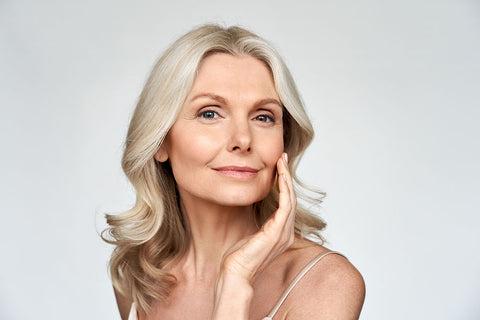Menopause brings with it hormonal changes that can affect various aspects of health, including the skin. One of the most common consequences is dry skin , a problem that can cause discomfort and affect quality of life and, in some cases, lead to more serious conditions.
Why do you have dry skin during menopause?
The main cause of dry skin during menopause is the decrease in estrogen production . This hormone plays a fundamental role in skin hydration and elasticity. As its levels decrease, the skin becomes thinner, more fragile and prone to dryness.
What other factors can contribute to dry skin during menopause?
In addition to the drop in estrogen, other factors can accentuate dry skin at this stage:
- Age: As we age, the skin loses its regenerative capacity and this makes it less nourished and, consequently, drier in appearance.
- Environmental factors: Dry weather, cold wind, excessive sun exposure and use of harsh chemicals can dehydrate the skin.
- Certain medications: Some medications, such as diuretics and antihistamines, can have dry skin as a side effect.
- Medical conditions: Some medical conditions such as diabetes or psoriasis can make dry skin worse.
Symptoms of dry skin during menopause:
Women who experience dry skin during menopause may experience some or all of the following symptoms:
- Tightness and itching: Dry skin can cause a constant feeling of tightness and itching, especially in areas such as the face, hands and elbows.
-
Flaking: Dry skin can flake, giving it a rough, dull appearance.

- Redness and irritation: Dry skin is more susceptible to irritation and redness, especially when exposed to external factors such as cold, wind or hot water.
- Wrinkles: The decrease in collagen and elastin, also associated with the drop in estrogen, can accentuate fine lines and wrinkles on the skin.
- Cracks and fissures: In severe cases, dry skin can crack and form fissures, which can be painful and increase the risk of infections.
How to avoid dryness during menopause?
Although menopause is a natural process, there are various strategies to combat dry skin and maintain healthy, hydrated skin:
Deep hydration
- Use moisturizing creams: It is essential to apply facial and body moisturizing creams regularly, especially after bathing or showering. Creams rich in emollients such as glycerin, hyaluronic acid or shea butter are recommended.
- Drink plenty of water: Internal hydration is also crucial. It is recommended to drink at least 2 liters of water a day to keep the skin hydrated from within.
- Look for products specifically for dry skin: There are moisturizers on the market that are specifically formulated for dry and sensitive skin. These creams often contain additional ingredients such as ceramides or shea butter that help restore the skin barrier and prevent water loss.
- Apply moisturizers several times a day: Dry skin requires constant hydration. It is recommended to apply facial moisturizer twice a day and body moisturizer at least once a day, or more often if the skin is very dry.
- Use a humidifier: A humidifier in your home can help increase the humidity in your home, especially during the dry winter months.

Daily skin care
- Gentle cleansing: Avoid harsh soaps that can dry out your skin. Opt for gentle, fragrance-free facial and body cleansers.
- Regular exfoliation: Exfoliating your skin 1-2 times a week helps remove dead skin cells and improve the absorption of moisturiser. Use gentle exfoliants suitable for sensitive skin.
- Sun protection: Dry skin is more susceptible to sun damage. Apply a broad-spectrum sunscreen with SPF 30 or higher daily to protect skin from UV rays.
Healthy habits to include in your daily life:
-
Balanced diet: A diet rich in fruits, vegetables, and omega-3 fatty acids can help keep skin healthy and hydrated. Including foods such as salmon, nuts, avocado, and chia seeds can be beneficial for the skin.
-
Avoid tobacco and alcohol: These substances can dehydrate the skin and worsen dryness.
-
Get enough sleep: A good night's rest is essential for skin regeneration. It is recommended to sleep between 7 and 8 hours per night.
-
Manage stress: Stress can negatively affect skin health. Practicing relaxation techniques such as yoga or meditation can help reduce stress and improve overall health.
What not to do?
- Avoid hot baths and showers: Hot water can strip the skin of its natural oils and make dryness worse. Opt for lukewarm or warm water.
- Do not use perfumed or harsh soaps: These products can irritate dry skin and worsen symptoms.
- Don't rub your skin vigorously: Rubbing dry skin can irritate it and make peeling worse. Gently pat your skin dry with a soft towel.
- Avoid overuse of exfoliants: Over-exfoliating your skin can remove natural oils and make dryness worse.
Remember:
- Consult your dermatologist: If dry skin is severe or does not improve with home care, it is important to consult a dermatologist for an accurate diagnosis and personalized treatment.
- Menopause doesn't have to mean dry skin: With proper care and a healthy lifestyle, you can maintain healthy, hydrated and radiant skin during this stage of life.
Skin care is important at every stage of life. Take care of your skin and enjoy deep hydration!
If you identify with any of the points in this blog or would like to know more about the topic → read the following blog and find out or take our test.
References:
- VIC. (2023, June 5). Why is my skin so dry during menopause? VIC. https://www.vichy.es/expert-advice/menopause/why-is-my-skin-so-dry-during-menopause
- Guerra Tapia, A. (2001). Menopause and skin. Actas dermo-sifiliograficas , 92 (10), 431–437. https://www.actasdermo.org/es-menopausia-piel-articulo-13019155
- Telfer, N. (2018, February 5). Skin and Cycle: How Hormones Affect Your Skin . Clue. https://helloclue.com/articles/cycle-az/skin-and-cycle-how-hormones-affect-your-skin
- Skin Care and Aging . (n.d.). National Institute on Aging. Retrieved April 17, 2024, from https://www.nia.nih.gov/espanol/piel/cuidado-piel-envejecimiento
- Piere Fabre digital finger print. (n.d.). Dryness and dehydration . Com.mx. Retrieved April 17, 2024, from https://www.eauthermaleavene.com.mx/a/sequedad-y-deshidratacion
- Self-Care - Dry Skin . (n.d.). Medlineplus.gov. Retrieved April 17, 2024, from https://medlineplus.gov/spanish/ency/patientinstructions/000751.htm
- Menopause: How it affects the skin and how to take care of it - skinmedclinic . (2023, October 2). Dr. Méndez de Vigo. https://skinmedclinic.es/menopausia-como-afecta-a-la-piel-y-como-cuidarla/
- Why does skin get dry? (2024, March 21). Nivea.es; Beiersdorf. https://www.nivea.es/consejos/piel-bonita/piel-seca
- Humidifiers and health . (n.d.). Medlineplus.gov. Retrieved April 17, 2024, from https://medlineplus.gov/spanish/ency/article/002104.htm
- Skin changes and care during menopause. (2023, July 13). Bionature . https://www.bio-nature.es/blog/cuerpo/cambios-piel-menopausia
- Beauty, J. (2023, June 2). The Benefits of Exfoliating: Why It's Essential for Healthy Skin . jessbeautyproducts. https://jessbeauty.com/blogs/news/the-benefits-of-exfoliating-why-its-essential-for-healthy-skin
- Effects of the Sun on Sensitive and Problematic Skin . (n.d.). Eucerin.cl. Retrieved April 17, 2024, from https://www.eucerin.cl/about-skin/indications/sun-and-sensitive-and-problematic-skin
- CORRECT USE OF SUNSCREEN . (2016, July 7). SEMES; SPANISH SOCIETY OF EMERGENCY AND URGENT MEDICINE (SEMES). https://www.semes.org/semes-divulgacion/uso-correcto-de-la-crema-solar/
- Piere Fabre digital finger print. (n/a). Menopause: how does it affect the skin and how to treat it? Dexeryl.com. Retrieved April 17, 2024, from https://www.dexeryl.com/es-mx/tu-piel/piel-y-menopausia
- Puertas, EF (2022, May 23). How to improve dry skin during menopause? LICO Cosmetics. https://licocosmetics.com/blogs/news/improve-dry-skin-during-menopause
- (S/f). Farmaciaabizanda.com. Retrieved April 17, 2024, from https://farmaciaabizanda.com/blog/remedies-for-dry-skin-in-menopause/
- Pimentel, C. L., & Puig, L. (2003). Dermatological alterations in menopause. Professional Pharmacy (Internet) , 17 (9), 84–91. https://www.elsevier.es/es-revista-farmacia-profesional-3-articulo-alteraciones-dermatologicas-menopausia-13053072




Comments (0)
There are no comments for this article. Be the first one to leave a message!